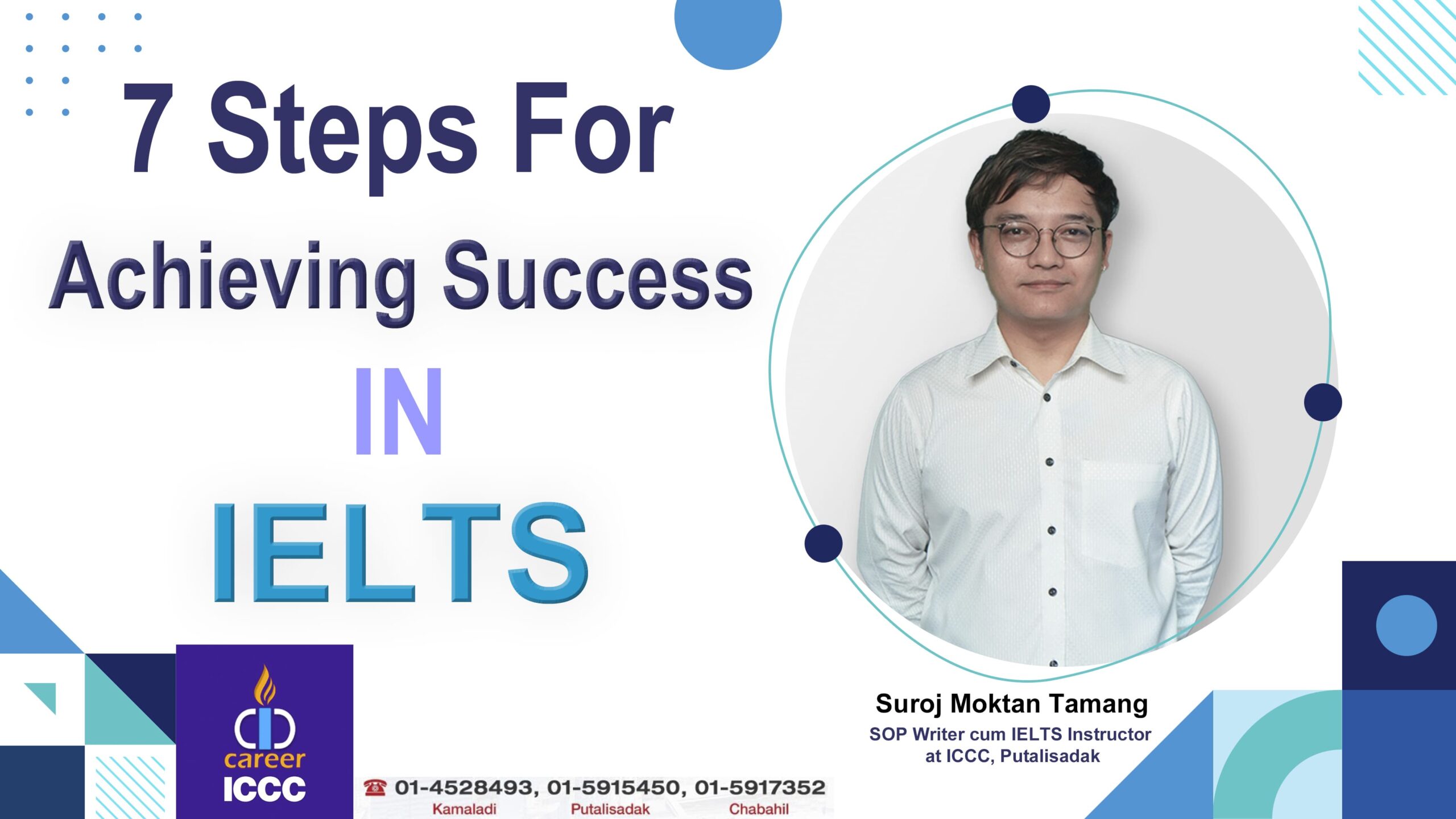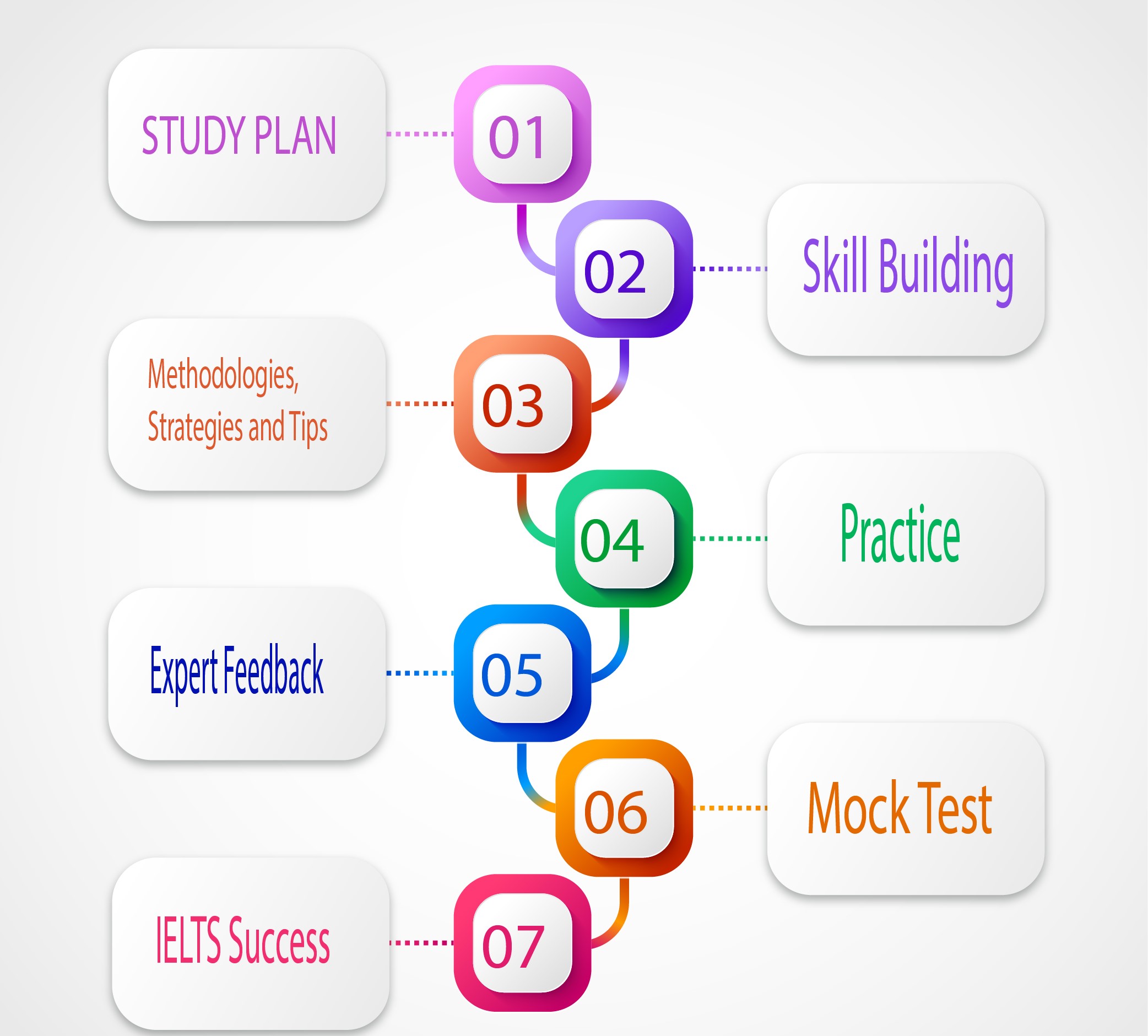
With a decade-long dedication to the noble profession of teaching, our esteemed educator emerges as a resilient and adaptable professional. Having garnered accolades for expertise in classroom management, course design, and curriculum development, they stand as an enthusiastic advocate for holistic education. Specializing in English Grammar, Literature, and Phonetics, this seasoned instructor has evolved into a preeminent IELTS educator, boasting a track record marked by numerous success stories.

Suraj Moktan Tamang is a seasoned SOP Writer and IELTS Instructor at ICCC, leveraging a decade of teaching experience. His expertise lies in crafting compelling Statements of Purpose and guiding students in English Grammar and Literature. In this dual role, Suraj contributes significantly to ICCC’s commitment to academic excellence and effective communication support for students.
It’s straightforward. The test format and criteria are identical worldwide, but everyone learns differently. Mastering IELTS and picking up its skills is a personal journey for each individual.
The IELTS test is the most well-known English language exam worldwide. Over 11,500 colleges, universities, employers, companies, agencies, and governments worldwide recognize IELTS. In Nepal, it’s highly favored by students and young people aiming to study abroad or move overseas as proof of their English language skills.
Here are seven steps for achieving success in IELTS, backed by testimonials from many successful IELTS students. These steps are tailored to fit Nepal’s education system and learning style, making them effective and natural to follow.

Step 1: Study Plan
A study plan is a common term you often hear in IELTS classes, but its actual meaning might not be clear. In Nepal’s education system, there isn’t much emphasis on structured planning. Teachers don’t typically follow a set curriculum or make detailed lesson plans, and students often lack a study planner to guide their learning.
A pre-designed curriculum and lesson plan can help teachers achieve course objectives on time. On the other hand, a study planner for learners is like a roadmap—it helps track progress toward your goals.
Your study planner is essentially what you commit to doing during your course. It involves deciding how much time you’ll dedicate to IELTS preparation, which score band you aim to achieve, and when you plan to take the real test.
Regardless of individual differences, everyone has seven days in a week. It’s crucial to create a personalized activity plan for each day until the end of your course. This tailored approach ensures a comfortable and suitable routine that suits your learning style and helps you progress steadily.
Step 2: Skill Building
Step 2 towards achieving success in IELTS isn’t just about starting when you join an IELTS prep class. It actually begins way before that, during your regular learning process. You can work on it anywhere – in social situations, at school, or even during casual conversations. This step focuses on improving your grammar, expanding your vocabulary, and refining your pronunciation skills.
Grammar:
Grammar forms the foundation of the English language. When it comes to mastering it, there are two main types: descriptive and prescriptive English. Descriptive English reflects what’s commonly used, while prescriptive English follows strict rules for language usage. If you aim to do well in Listening, Reading, and Writing Tests, focusing on descriptive English will guide you to success. On the other hand, when it comes to the Speaking Test, adhering to prescriptive English can be a great choice.
Vocabulary:
Put simply, the IELTS Listening and Reading tests are all about knowing words. It might be surprising, but it’s true. Vocabulary matters a lot and makes up a big part of your scores in IELTS Writing and Speaking too. So, how can you improve your vocabulary? There are two ways: intentional and incidental learning. Intentional learning involves studying topic-related words, looking them up in dictionaries or online. Incidental learning is about noticing unfamiliar words in your daily life and jotting them down to search for their meanings, synonyms, and antonyms later. Figure out what method suits you best.
Pronunciation:
Pronunciation is a crucial part of how you speak with an accent. It includes stress, intonation, and even dialects or slangs. But let’s focus on pronunciation for now—it’s about making the right sounds when saying words using your voice. It’s not easy to sound exactly like a native speaker in just a few months or a year. However, being around native English speakers can help you improve and speak more clearly because of their influence.
Why does pronunciation matter? Think about why you speak—it’s to communicate, right? You want someone to understand you when you talk. If your way of saying words doesn’t match the standard pronunciation, do you think native English speakers would get what you’re saying? Or if they pronounce a word differently, would you understand them? Probably not. This communication gap can cause issues, especially in IELTS Listening and Speaking tests.
Step 3: Methodologies, Strategies and Tips
In the world of IELTS in Nepal, the saying “There are a hundred men, and a thousand lies” hits the nail on the head. Let’s say you have an IELTS teacher who scored Band 7. Can they help you reach Band 8? No, because they might not know the best methods, strategies, and tips for mastering the IELTS test. These so-called IELTS Gurus sell the idea of ‘TIPS & TRICKS.’ But seriously, can you trick the IELTS examiners? They’re experts who handle hundreds of IELTS candidates like you every day. To truly guide someone in learning IELTS, you need a mentor with years of experience, someone who has achieved Band 9 through multiple tests. It’s like the saying goes, ‘A donkey is always a donkey. Just walking the same path for years doesn’t turn a donkey into a horse.’ These fake IELTS gurus may look professional, but they lack what it takes to guide IELTS hopefuls to success. Perfect practice is what makes one perfect. So, it’s crucial to get the right learning methods, strategies to tackle each question, and helpful tips before your real test.
Step 4: Practice
Many Nepali students learning IELTS attend their classes but then end up hanging out outside of their homes, like in cafes or elsewhere. Similarly, after finishing online classes or watching YouTube videos, instead of practicing, they jump to the next video. That’s why I believe in the principle: “Knowledge is of no value unless you put it into practice.” After leaving your IELTS class, it’s important to reflect on what you’ve learned and practice. Studies have found that learners only retain about 10% of what they’re taught, so it’s crucial to sit down at your study table and reflect on your learning before you forget even that 10%.
Step 5: Expert Feedback
Imagine you’ve put in a lot of effort practicing, and now you’re seeking feedback. You might share your work with friends, family, or even someone online. But what they tell you could swing to extremes—they might say you’re terrible at it or amazing. This kind of feedback could leave you feeling down or completely overwhelmed because it doesn’t really help you improve.
Instead of relying on feedback from just anyone, it’s smarter to seek guidance from an expert. An expert can precisely pinpoint what you’re good at and where you need to improve across all the IELTS skills. They understand the different question types, formats, tasks, and what each question is asking for.
I believe Nepali students learning IELTS already have strengths in English since it’s a mandatory subject in Nepali schools. You’ll keep showing these strengths naturally, so there’s no need to worry too much about them. What’s important is identifying your weaknesses, and only an expert can do that effectively.
So, after practicing, it’s beneficial to share your work with an IELTS expert. They’ll highlight your strengths and weaknesses and guide you on how to improve your weaker areas. This way, you’ll be on the right track to achieve success in the IELTS test.
Step 6: Mock Test
A Mock Test is basically an IELTS practice test you do at home or your IELTS learning center. It’s designed to simulate the actual IELTS exam you’ll take at places like the British Council or IDP. It’s more than just a test – it assesses your English language abilities, your test-taking skills, and even how you handle the stress of taking the exam. Feeling nervous during tests is normal. Sitting in one place for about 3 hours and going through multiple tests can be tough. So, doing mock tests helps you get used to the exam conditions and prepares you for the real test day by getting familiar with the pressures you might feel.
Step 7: IELTS success
Achieving success in the IELTS exam is like opening a door to your dreams of studying abroad or moving to an English-speaking country. While getting a decent score might be doable, aiming for a higher score can make a big difference. It can lead to scholarships for your education, better job opportunities, and even a quicker path to permanent residency. Take a moment to reconsider and make a thoughtful choice about your IELTS goals – it can impact your future in significant ways.
Writer:
Suroj Moktan Tamang
SOP Writer cum IELTS Instructor at ICCC, Putalisadak
Write your comment